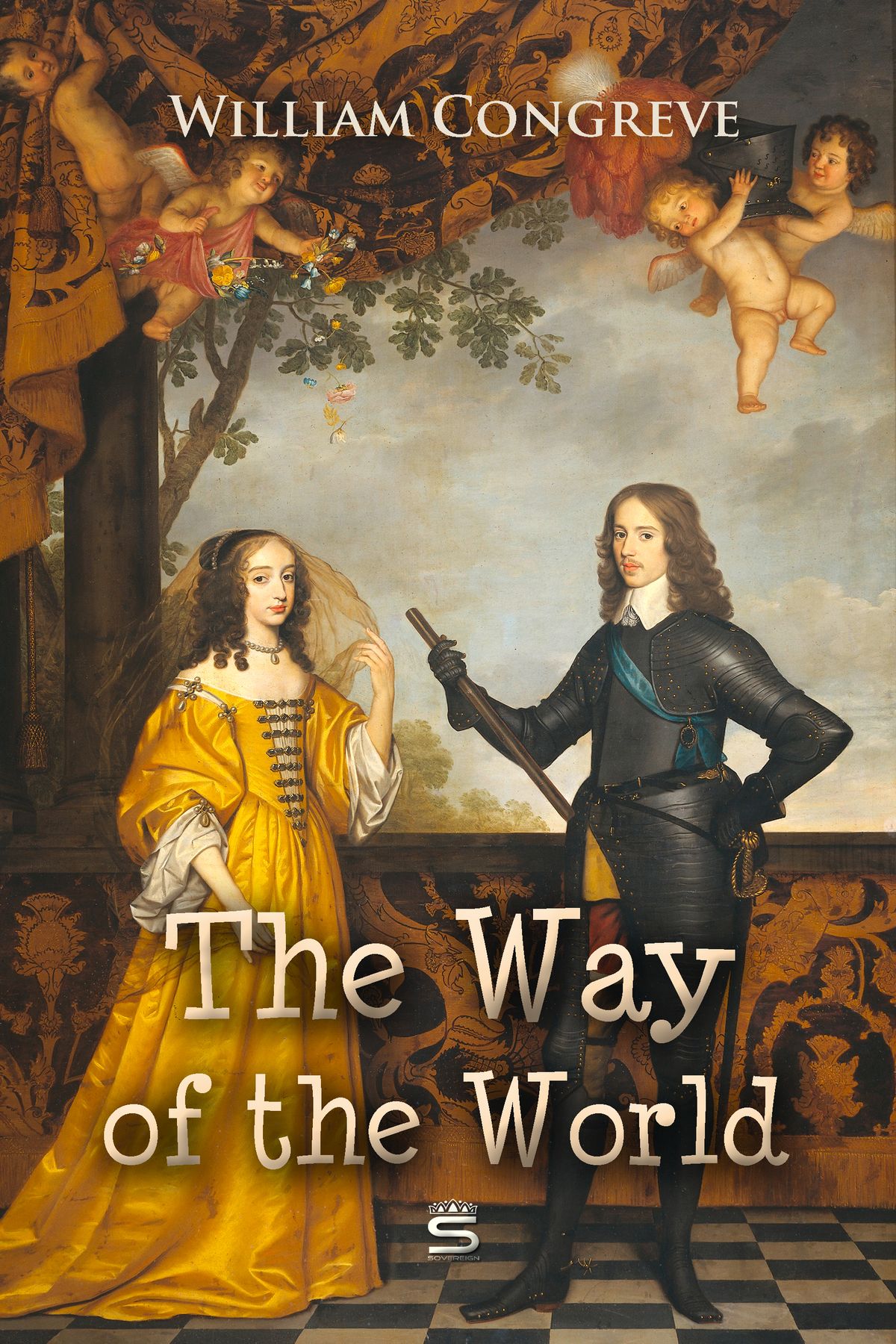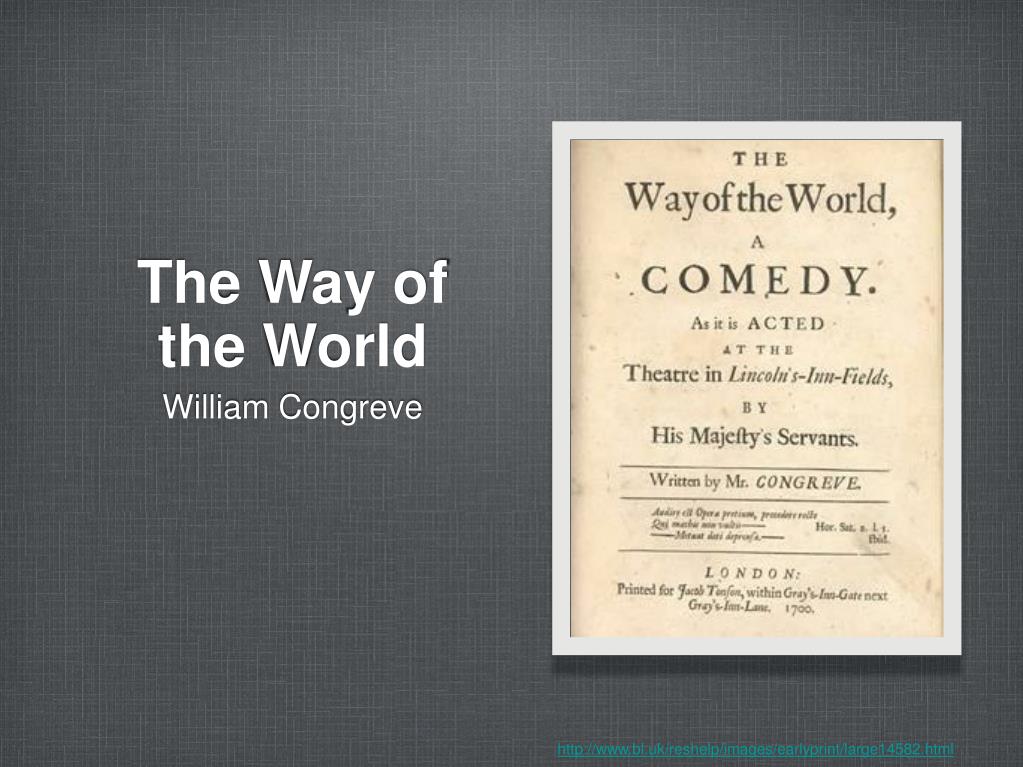The Way Of The World: Unlocking Congreve's Masterpiece & More!
Can a play, penned over three centuries ago, still resonate with the complexities of our modern world? "The Way of the World," a Restoration comedy by William Congreve, not only endures but continues to captivate audiences with its sharp wit, intricate social commentary, and timeless exploration of human nature.
First gracing the stage in early March 1700 at the Theatre in Lincoln's Inn Fields, London, "The Way of the World" stands as a cornerstone of English literature. It is lauded as one of the finest examples of Restoration comedy ever written, a genre that flourished after the restoration of the Stuart monarchy in 1660, a period marked by a resurgence in the arts and a shift in social mores. This play, however, was not an immediate success. Initially, the audiences, accustomed to more straightforward narratives, found the play too sophisticated, even vulgar. Yet, the play's brilliance has ultimately prevailed, and "The Way of the World" continues to be performed in various forms, from operatic adaptations to theatrical productions.
The enduring relevance of the play lies not only in its technical artistry but also in its incisive portrayal of the human condition. The characters, particularly the lovers Millamant and Mirabell, navigate a society obsessed with reputation, wealth, and social maneuvering. Their quest to find love, while simultaneously preserving their social standing, forms the core of the play's narrative. The play critiques the superficiality of the aristocratic London society, where wit, charm, and the ability to manipulate language become weapons in the game of love and social advancement. This setting of the play is precisely in London during the Restoration period, a time when Charles II was restored to the throne in 1660, marking a significant turning point in English history after a period of civil war and Commonwealth rule under Oliver Cromwell.
- Aaliyah Down Syndrome Understanding The Facts Debunking Myths
- Mia Yilins Personality Tests Illusions Unveiling The Truth
The play's themes of love, marriage, deceit, and social dynamics, though set against the backdrop of 18th-century high society, have a striking relevance today. The pursuit of power, the complexities of romantic relationships, and the importance of social standing are issues that remain familiar in contemporary life. Congreve's masterly use of language, evident in the witty repartee and carefully crafted dialogues, makes the play a joy to read and watch. The characters' words become a reflection of their inner lives and the intricacies of their interactions. As critics have frequently noted, the plays brilliance lies in the characters' lines, like those of Witwoud, who showcase Congreve's extraordinary talent.
| Category | Details |
|---|---|
| Play Title | The Way of the World |
| Genre | Restoration Comedy, Comedy of Manners |
| Author | William Congreve |
| Premiere Date | Early March 1700 |
| Premiere Location | Theatre in Lincoln's Inn Fields, London |
| Setting | London, during the Restoration period |
| Themes | Love, Marriage, Deceit, Social maneuvering, Reputation, Wealth, Social dynamics, Wit |
| Key Characters | Mirabell, Millamant, Fainall, Lady Wishfort, Witwoud |
| Notable Aspects | Witty dialogues, satirical portrayal of aristocratic society, sophisticated characters |
| Critical Reception | Initially not well-received; now considered a masterpiece of Restoration comedy |
| Significance | Illustrative of Restoration Comedy, with exemplary use of the comedy of manners |
| Further Reading | Folger Shakespeare Library |
The plot of "The Way of the World" hinges on the efforts of Millamant and Mirabell to secure their future together. Before the events of the play unfold, key circumstances have already taken place, shaping the relationships and conflicts that drive the narrative. The characters are enmeshed in a complex web of alliances, negotiations, and strategic actions, all aimed at achieving favorable social positions or financial gains. Fainall, the widowed daughter of Lady Wishfort, plays a crucial role in the plot, contributing to the intrigues and social complications that define the play.
Congreve's play also offers profound insights into the roles of women in society. Contrasting the portrayal of female characters in Restoration and early 18th-century dramas reveals changes in the representation of women. The play explores the societal constraints placed on women, their struggles for autonomy, and their use of wit and intelligence to navigate a male-dominated world. The complex female characters, like Millamant and Lady Wishfort, reflect the intricacies of women's experiences and their attempts to assert control over their lives and destinies.
The plays structure, characterized by witty exchanges, deviates from conventional dramatic plot twists. Instead, it creates a cohesive world populated by sophisticated individuals free from the constraints of melodrama. The dialogues and witty repartee become vehicles for character development, social satire, and the exploration of fundamental human emotions. Congreve commences "The Way of the World" with a prologue that encapsulates the general struggles of playwrights in their quest to satisfy audiences and critics alike. In this, he implies the foolishness of such an endeavor and suggests that it would be more beneficial to write a play that helps the audience understand the distinction between a fool and a wit.
The play serves as an exemplary case of Restoration comedy, with Congreve masterfully employing the typical features of this genre, including witty dialogue, satire of social conventions, and the portrayal of the upper echelons of society. Its goal is to showcase the manners of contemporary high society in a satirical manner. By using witty banter as a means of conveying meaning, the play explores the social maneuvers of its characters and unveils the concealed complexities of love and relationships.
The title "The Way of the World" is central to comprehending the play's deeper meaning. It acts as a guiding thread, forming the characters and themes. This analysis provides a more in-depth understanding of the title's importance and how it interacts with the play's narrative. Congreve's work, with its clever interplay and sharp observations on human nature, offers an insightful perspective on the intricate dynamics of human relationships and the social constraints of the era.
The plays impact is further amplified by its continued presence in cultural spaces, often adapted for modern audiences. Whether on stage or in academia, "The Way of the World" serves as a fascinating exploration of its era, offering an enjoyable look into the sophisticated society of 18th-century England. From its satirical portrayal of London's high society to the intricacies of the relationships between its characters, the play continues to entertain and provoke thought.
Considered by many to be Congreve's finest achievement, the play ridicules the assumptions of its time, particularly those related to love and marriage, revealing the complexities of a society where appearances often mask darker truths. The witty and clever use of language is still admired today, and critics frequently comment on the brilliance of some of the speeches, and the overall depth of the characters in the play. The play's enduring appeal is a testament to its timeless themes and exceptional writing.
"The Way of the World" explores themes that still resonate with audiences today, and the play continues to find new meaning, as new generations read the play. With its sharp wit, intricate plot, and examination of human behavior, the play remains a compelling piece of work, continuously examined to provide new insights. The plays of William Congreve, especially "The Way of the World", are celebrated for the playwright's extraordinary talent and continue to offer the world a timeless reflection on humanity.



Detail Author:
- Name : Reggie Orn
- Username : trey.reinger
- Email : ugreen@gmail.com
- Birthdate : 1987-05-27
- Address : 49608 Beahan Corners Suite 935 Juneland, VT 30504
- Phone : +1-860-448-4650
- Company : Ward-Lubowitz
- Job : Bill and Account Collector
- Bio : Qui sunt aut nihil voluptas ipsam sed ipsum. Sed doloremque quaerat perferendis rem. Sed ea id ratione quae incidunt et.
Socials
twitter:
- url : https://twitter.com/emilia_bosco
- username : emilia_bosco
- bio : Nihil hic dolores consequatur sed. Corporis necessitatibus eaque eius ea nisi. Consectetur reiciendis eius ratione nihil. Beatae aliquam dolores blanditiis et.
- followers : 4075
- following : 2790
facebook:
- url : https://facebook.com/emilia.bosco
- username : emilia.bosco
- bio : Totam recusandae vero nostrum tenetur saepe excepturi soluta.
- followers : 1714
- following : 1826
tiktok:
- url : https://tiktok.com/@emilia_xx
- username : emilia_xx
- bio : Voluptates et velit dolor in aut occaecati.
- followers : 1331
- following : 470
instagram:
- url : https://instagram.com/ebosco
- username : ebosco
- bio : Maiores corporis esse repellendus numquam. Earum aut unde quia nobis soluta enim.
- followers : 2340
- following : 2161
linkedin:
- url : https://linkedin.com/in/emilia_bosco
- username : emilia_bosco
- bio : Illum voluptatum nobis quisquam sint nihil et.
- followers : 5396
- following : 1177